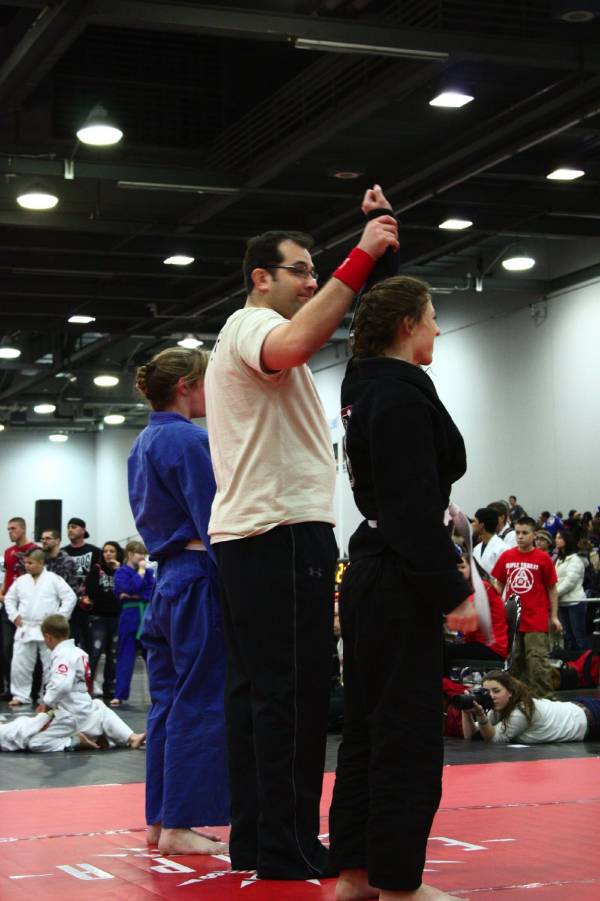“Jiu-jitsu” translates from the Japanese as “the gentle art.” The idea here is that practitioners can execute moves realistically and at full speed without having to worry they will injure their partner. If caught in a submission, all the partner need do is tap the submitter’s body to signify capitulation, and the submitter will release the submission.
However, if the submitter is going to be able to release the submission at the right time, before damage is done, the person in the submission must do his/her part. S/he must be humble, laying his/her ego aside and acknowledging being bested. Particularly for those of us who started BJJ after having achieved some measure of professional and personal success in other domains, it can be difficult to concede that someone has outperformed you. If you stay with grappling for any length of time, however, it will happen again and again. You’ll have to repeatedly acknowledge – and embrace – defeat.
The alternative is that the person in the submission forces the other person to decide whether or not to apply the submission until pain or unconsciousness results. And it is not fair to put the other person in that position. We are all responsible for our own well-being, and if we allow our egos to get in the way when we are working on getting better at BJJ, then we are missing the point. And acting like a jerk.
Humility goes deeper than just tapping, too. It should pervade every interaction on the mat, simultaneously communicating respect, healthy self-esteem, and a willingness to defer to others. I have had the privilege of watching extremely high level practitioners demonstrate humility, by working on moves that haven’t historically been part of their usual repertoire, by putting themselves in disadvantageous positions and trying to work out of them (and yes, tapping when it doesn’t work the first time), by celebrating the progress of the “lowliest” white belt. These practitioners demonstrate that humility is not only the bigger choice, it is also the path to improvement. And what’s good enough for practitioners who have probably been black belts for longer than I have been training is good enough for me.
 You may say it’s easy for a high-level practitioner to demonstrate humility. I certainly don’t belong in the category of grappler I just described above, but I do have some experience humbling myself to get better at jiu-jitsu. If I’m any indication, it doesn’t get easier or more enjoyable. It just becomes something you get more used to – you become comfortable with the discomfort of wishing you were better, worrying about what other people think and whether your efforts are going to pay off, and sometimes feeling ornery and uncooperative.
You may say it’s easy for a high-level practitioner to demonstrate humility. I certainly don’t belong in the category of grappler I just described above, but I do have some experience humbling myself to get better at jiu-jitsu. If I’m any indication, it doesn’t get easier or more enjoyable. It just becomes something you get more used to – you become comfortable with the discomfort of wishing you were better, worrying about what other people think and whether your efforts are going to pay off, and sometimes feeling ornery and uncooperative.
That being said, if you aren’t yet comfortable, fake it. Otherwise, you run the risk of becoming the aforementioned jerk, and this increases the likelihood you will get your ass beat by someone who learned how to be humble, which enabled that person to get better than you at BJJ.
You may see posturing among MMA fighters and wonder how/why they get to talk trash if you don’t. Well, part of their job is to entertain and create anticipation. (But even some of the outspoken fighters are soft-spoken in real life.) If you are a run of the mill grappler, it’s not cool for you to go into the nearest IHOP and act like a d**chebag, even if you did just get a stripe on your belt. (This may come as a shock, but the waiter doesn’t give a crap.) If you happen to be able to travel through time and you ride a unicorn to work, okay, you get to act like your poop smells like roses. Otherwise, I daresay you’d be wise to practice in real life the humility I’m suggesting we practice on the mat.
Here is a non-exhaustive list of handy ways to demonstrate that you are NOT being humble during your training:
- You feel and/or act superior to someone if you think you can get away with it.
- You refuse to tap.
- You try to finish your instructor’s sentences.
- You train angry, especially after someone catches you in a finish.
- You argue with your instructor for any reason.
- You keep a running tally of exactly how many times you’ve tapped someone and how many times you’ve been tapped.
- You give 100% resistance during the drilling part of the class when not instructed to do so.
- You routinely come late to class so you can avoid the warm-up.
- You have – and worse, offer – an opinion about when you should be promoted.
- You stop drilling the technique before the instructor tells you to because “you’ve got it, thanks.”
- You successfully execute a move and look around to see who noticed.
We are human. It can be exceedingly difficult to put our egos aside. But there is no other way to get better at BJJ, or, truthfully, at life. If we’re not willing to be bad at something first, we’ll never get better at it. And as I’ve mentioned, if we are unable to access our humility, both on the mat and in the outside world, no one will like us, everyone will hate us, and we’ll want to go out and eat worms. That should be reason enough to give it a try!






